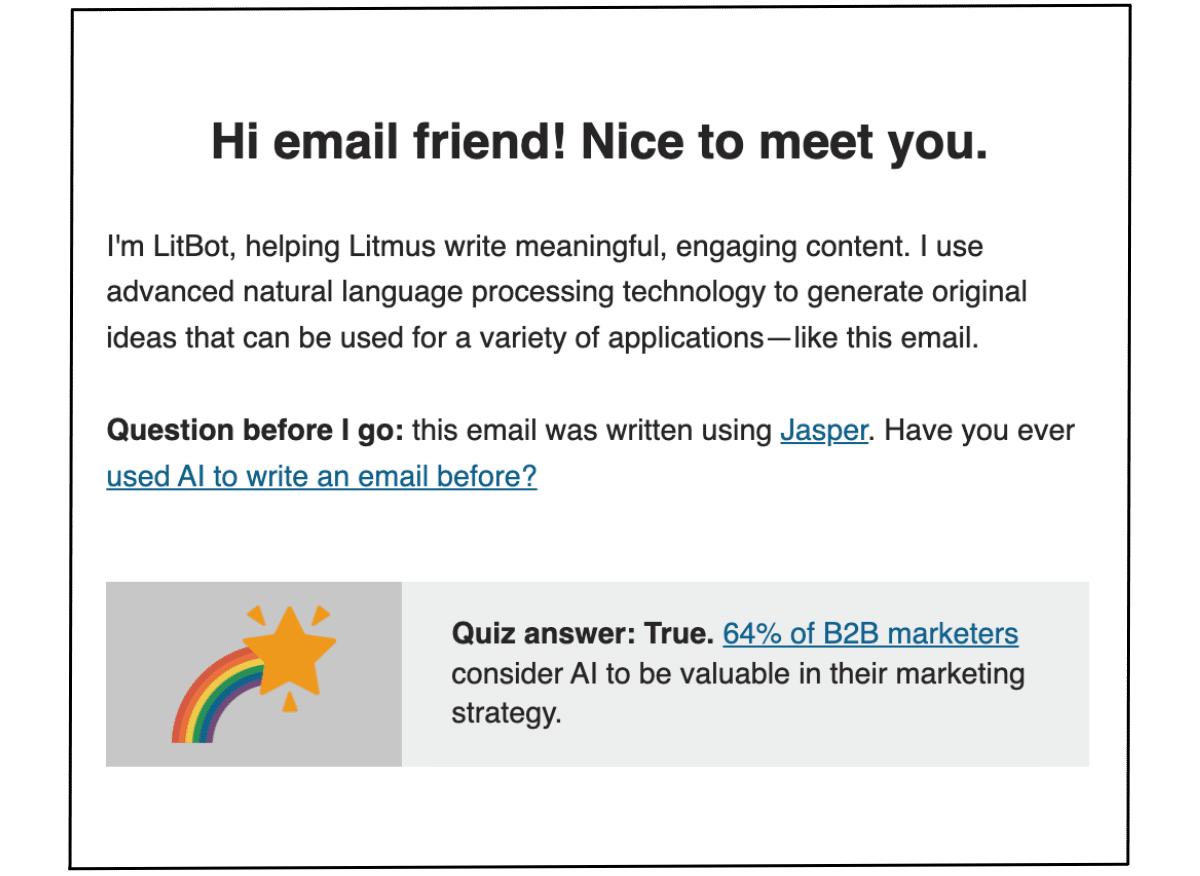A Practical Guide to Using AI in Email Marketing (For the Conscientious Marketer)
Artificial intelligence (AI) is becoming increasingly prevalent. From customer service chatbots to academic research papers and even fake Drake songs, AI is everywhere.
But as exciting as this new frontier is, it’s brought to surface a multitude of legal, ethical, and social concerns that have yet to be addressed with AI as it stands today.
So, what’s the “right” way to use AI in email marketing? In this blog post, we’ll examine the ways email marketers can incorporate generative AI into their email programs while adhering to some guiding principles that address the most significant concerns surrounding AI.
- The journey to modern day AI
- How is AI regulated today?
- Guiding principles: Using AI in email marketing responsibly
The journey to modern day AI
Big tech companies are going all in on AI and it’s shaping the world of marketing. For better or for worse.
How did we get here?
While AI has been around for a while, the release of DALL-E 2 and ChatGPT in 2022 were catalysts to the AI arms race. ChatGPT even set records for being the fastest-growing consumer application in history. The release of these two generative AI tools made advanced AI more widely available to the public, and made us “part of the world’s largest beta test”… while simultaneously unveiling its flaws.
The most prevalent concerns around AI include:
- Privacy and surveillance
- Bias and discrimination
- Inaccurate data
- Copyright infringement
- Plagiarism
- Data breaches
Those are some heavy-hitting issues. Despite all the time-saving benefits AI can deliver, that list of concerns is substantial enough to give any marketer pause.
How is AI regulated today?
While these issues run the gamut, there isn’t much regulation for AI as it stands today—in the United States, at least. But change is underway: OpenAI CEO Sam Altman is set to testify before Congress on May 16, 2023 as lawmakers push to craft comprehensive guardrails to address growing concerns with AI.
Government agencies in the U.S. have also stepped in. The Federal Trade Commission (FTC) has issued guidance for deceptive claims on AI-powered services while the National Institute of Standards and Technology (NIST), an agency in the Department of Commerce, has developed a framework for using AI responsibly.
Other parts of the world have started to take action, with the Artificial Intelligence Act (AIA) in Europe and The Artificial Intelligence and Data Act (AIDA) in Canada.
While we’re all still in the process of figuring out what regulations we should implement around AI, the conversations around what is legal and ethical in the industry are buzzing. The takeaway is essentially that it will probably end up being regulated more in the U.S., but the how, when, and where remain to be seen.
Guiding principles: Using AI in email marketing responsibly
So, now that we know about the risks of AI, the fact remains that everyone is still using it. Why? Well, a top selling point for using AI is its potential to yield productivity-boosting benefits. Plus, it promises a way to do more with less, while keeping costs down.
Sounds great, right? After all, we email marketers sure could use the help. Email was ranked one of the top three most impactful marketing channels by nearly 80% of our 2021 State of Email survey respondents, and yet 70% said their email workload had increased.
AI has the power to help email marketers write copy, create imagery, provide hyper-personalization, and create automations. But as attractive as these benefits are, it’s a double-edged sword. Since regulation is still in the works, we’ll have to content ourselves with common sense.
Here are some of our team’s practical, no-nonsense guidelines for using AI in email marketing:
Vet your vendors.
First things first: vet your vendors. When selecting a tool or service that’s right for you, consider:
- How are they ensuring data security? Since AI systems often rely on personal data, what are they doing to protect user data to ensure it’s private and secure?
- How are they ensuring data accuracy over time? What efforts are they making to continually monitor the accuracy of their data?
- How much visibility will you have? What large language models or data sets are they using? By getting visibility on this, you can better evaluate how much to trust the accuracy of the output.
Having this basic knowledge will help you more confidently use AI in your email day-to-day. Aim to have a clear understanding so you can easily explain to your colleagues, customers, and subscribers the benefits and shortcomings of your selected vendor (and AI, in general).
Check in regularly for bias and discrimination.
Another important piece: regularly evaluate your vendors for bias’ that may be present in their models. Responsible AI practices should eliminate biases that are inherent to the models on which their systems are trained. AI systems can generate unfair outcomes, leading to the perpetuation of bias and discrimination.
Watch outs for email imagery
Email marketers should be especially careful when using generative AI for imagery. In 2022, researchers found DALLE-2’s depiction of people to be “too biased for public consumption,” with a strong tendency towards generating images of mostly white men by default, overly sexualized portrayals of women, and reinforcing racial stereotypes.
Although OpenAI has implemented techniques to more accurately reflect a diverse population, it’s still an imperfect work in progress.

Another watchpoint to keep in mind: AI-generated imagery is trained on billions of images from the web. That includes artists’ work without their consent or permission. This is an intellectual property problem that may infringe on copyrights.
Several instances have occurred where creators and artists unwillingly found their work used to train a generative AI model. While there have been lawsuits against Stability AI and Midjourney, regulation is still in its infancy.

Watch outs for email copy
Keep in mind, much like humans, even AI tools aren’t perfect. Some have been known to produce outputs that are nonsensical or offensive. If you’re using generative AI to help write copy, take this into account. Use it as needed, but exercise caution and sound judgment.
All in all, if you’re using generative AI tools, we recommend you…
Be transparent.
It goes without saying, transparency is key. A survey by Dentsu found over 70% of survey respondents want brands to disclose when they use AI across products, services, experiences, and content.
Although lifting the marketing veil may seem counterintuitive, being transparent with your audience ultimately leads to building trust.
Incorporating a few words that inform subscribers about the use of AI can easily suffice.
In a recent edition of our newsletter Litmus Weekly, we used generative AI to assist with email copywriting. We concluded the email with a simple acknowledgement, “this email was written using Jasper,” weaving it into the copy as naturally as possible.

Here’s an example of an email from The New York Times that’s a little more explicit:

In the image caption, they specified that the image was produced with AI, even going as far to share the prompt and tool they used.
If you’re ever in doubt, give credit. A simple “powered by AI” in your email can go a long way in fostering brand trust.
With great power comes great responsibility
AI presents its fair share of risks and challenges, but it’s not the enemy. We, as the “human” part of the AI equation, should be mindful practitioners, engaging with these tools fully aware of both their capabilities and imperfections.

Kimberly Huang
Kimberly Huang is a Content Marketing Manager at Litmus
